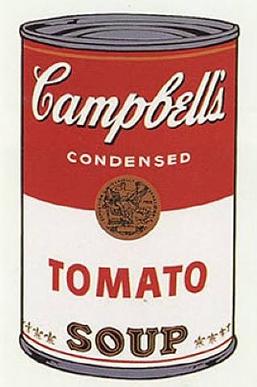Minimalism is an excellent framework for decision making
I’d be willing to bet that most people’s first contact with Minimalism was through the context of physical objects. How do I organize my stuff? How can I own fewer things? Is it okay to get rid of this ornament from Aunt Flo? What the heck does ‘spark joy’ mean?
Having fewer things is wonderful. But minimalism can be so much more.

Minimalism is not just about things
A tool for thinking creatively: try using a given framework in a different domain. Huge leaps are made when applying seemingly disconnected ideas. Probability being used to solve thermodynamic problems. Evolution applied to computer algorithms. Celebrity culture and advertising turned into art.

Advertising imported into the art domain
Unfortunately, when learning a new mental model, it’s difficult to divorce the core ideas from the context in which you learned it.
We are all, in a way, handicapped in a similar way, unable to recognize ideas when presented in a different contexts. It is as if we were doomed to be fooled by the most possibly superficial part of things, the packaging, the gift-wrapping paper around the object. –Nassim Nicholas Taleb
Minimalism is heavily gift-wrapped in the domain of ’things’ (here I’m excluding the artistic visual style). Declutter. Live with less. Discard.
To escape this domain dependence, we have to unwrap the package, remove the original context that hides the true gift.
With context:
Minimalism is about deciding what to get rid of, because we have limited physical and mental space in which to keep things.
Without context:
Minimalism is about making hard choices with limited resources
Where else do we have to make hard choices, with limited resources?
Minimalism is an excellent framework for decision making
Every decision we make is constrained by limited resources. Money, materials, energy. Even the richest man in the world is limited by time, and has to make decisions accordingly.
Here are some factors that make minimalism well suited for decision making:
- Practicing minimalism helps develop an improved ability to discern what’s important and what’s not
- It becomes easier to let go of ‘sort of important’ things
- What you choose to keep is a reflection of your values
Examples of Decision Making with Minimalism
There are plenty of ways to use minimalism when making decisions.
Choosing what to work on
Some of the most effective productivity methods involve a heavy amount of elimination:
- Ivy lee Method - List 6 most important tasks, work on one at a time
- Buffets “2 list” Strategy - List 25 most important career goals, pick 5 to work on, and avoid the other 20 at all costs
- “Hell Yeah!” or “no.” - saying “no” by default can free you to spend more time on the important things
- Removing all distractions - for a given task, eliminate everything that isn’t your work.
Deciding what media to consume
The internet provides us with a fire-hose of information. Minimalism is a good framework for dealing with it.
Lacking a strategy for media consumption is no good. At best you’re consuming junk at random, at worst you’re so overwhelmed that you learn nothing.
Ways to minimize your media consumption:
- Limit yourself to certain types of media (e.g., books over cable)
- Limit yourself to older media (Lindy Effect)
- Only consume media recommended to you by smart people
- Collect articles you might want to read in a read-later app. Let them marinate for a few days, then get rid of articles that don’t seem interesting.
It’s still important to keep some serendipity - topics that resonate with you are worth pursuing.
Choosing where to eat
Sometimes the most difficult decisions are the most mundane. Choosing where to eat with a group can turn into an hour-long ordeal. The problem is too much choice. Minimize.
- You pick 5 places to eat
- Everyone else in the group gets to veto
- Go eat at the last restaurant left
What Else?
What other domains can be viewed through the lens of minimalism?
Want to level up your productivity and start getting work done?
We built an interactive coach, available 24⁄7 to give you a feasible next step to improve your productivity skills.
Get the Digital Productivity Coach
Further Reading
- Minimalism Resources
- Essentialism By Greg McKeown
- The Life Changing Magic of Tidying Up - Book Notes
- The Power of No by James Altucher